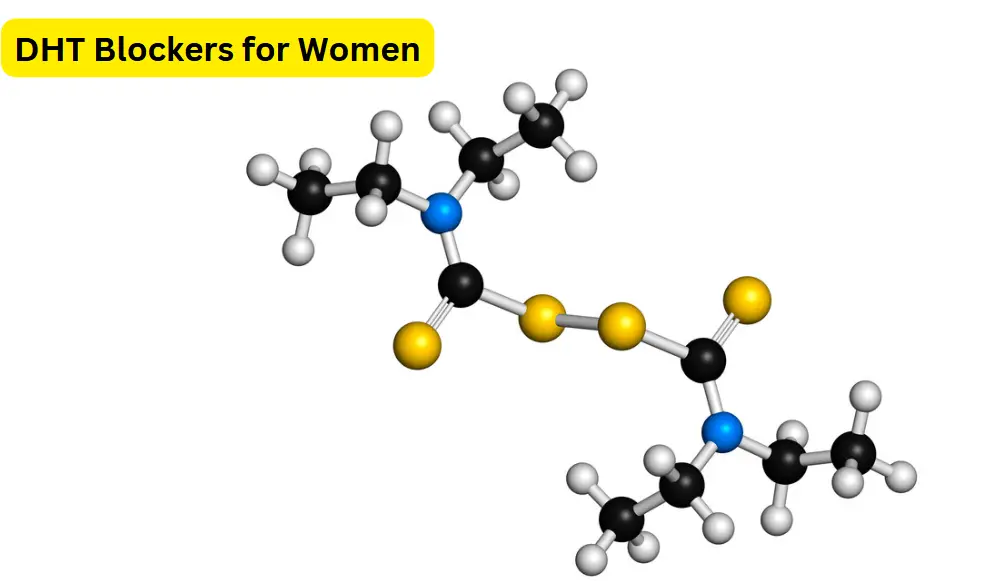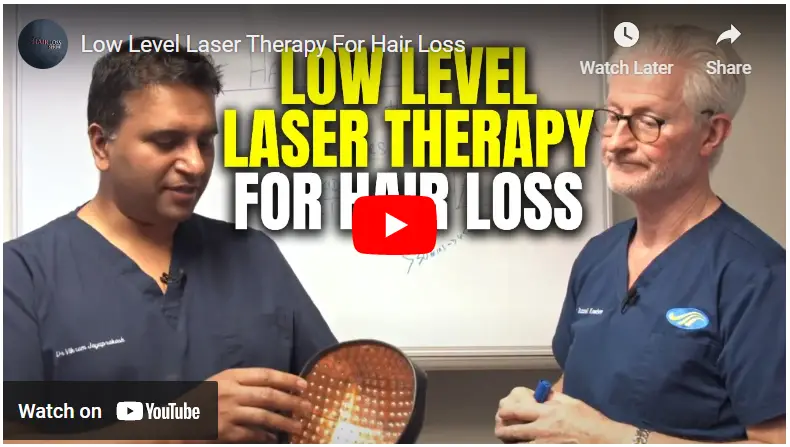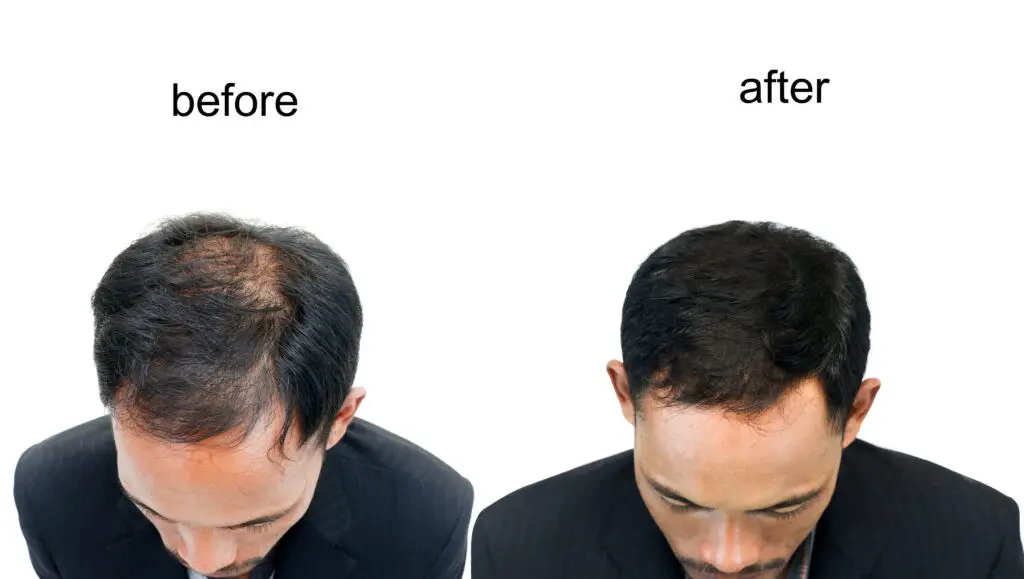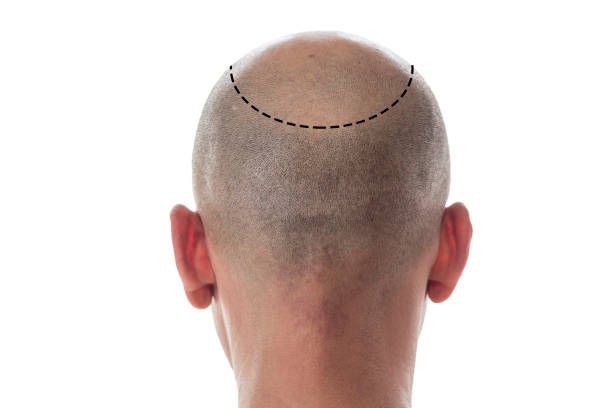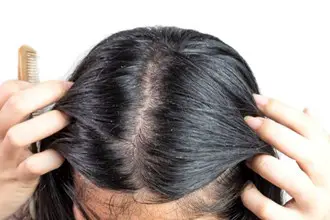Hair loss is a common concern for many women, and it can be a source of significant stress and anxiety. While there are many potential causes of hair loss, one key factor that often plays a role is Dihydrotestosterone, or DHT. This hormone, which is derived from testosterone, can contribute to hair loss in both men and women. But the good news is that there are ways to combat this. One of the most effective strategies is the use of DHT blockers.
DHT blockers work by preventing the conversion of testosterone into DHT, thereby reducing its levels in the body. This can help to slow down or even stop hair loss, and in some cases, it may even promote new hair growth. However, like any treatment, it’s important to understand how DHT blockers work, what types are available, and what potential side effects they may have.
In this article, we’ll explore everything you need to know about DHT blockers for women, from understanding the basics of hair loss to choosing the best DHT blocker for your needs. We’ll also delve into the science behind DHT and hair loss, and we’ll answer some of the most frequently asked questions about DHT blockers.
Whether you’re just starting to notice thinning hair or you’ve been battling hair loss for a while, this guide is designed to provide you with the information you need to make an informed decision about DHT blockers. So, let’s dive in and start exploring the world of DHT blockers for women.
If you’re interested in learning more about the potential side effects of blocking DHT, check out our in-depth article on Blocking DHT Side Effects.
Key Takeaways
In this comprehensive guide, we’ve explored the topic of DHT blockers for women in depth. Here are the key takeaways:
- DHT, or Dihydrotestosterone, is a hormone that can contribute to hair loss in both men and women. DHT blockers work by inhibiting the production of this hormone, helping to slow down or stop hair loss.
- There are various types of DHT blockers available, including oral supplements, topical treatments, and specially formulated shampoos. Each type has its own benefits and potential side effects.
- While DHT blockers can be effective, they are not a magic bullet. Hair loss can be caused by a variety of factors, and DHT is just one piece of the puzzle. A comprehensive approach to hair loss treatment may also include lifestyle changes such as a healthy diet, regular exercise, and stress management.
- Always consult with a healthcare provider before starting any new treatment to ensure it’s safe and suitable for your specific needs.
Understanding Hair Loss in Women
Hair loss in women is a complex issue with various potential causes. It’s not just about vanity – hair loss can significantly impact a woman’s self-esteem and emotional well-being. To effectively combat hair loss, it’s crucial to understand the underlying mechanisms, including the hair growth cycle and the role of hormones like Dihydrotestosterone (DHT).
Hair grows in cycles, with each hair follicle going through phases of growth (anagen), transition (catagen), and rest (telogen). At any given time, most of your hair is in the anagen phase, actively growing. However, various factors can disrupt this cycle, leading to increased hair shedding or slower hair growth.
One of the key players in hair loss is DHT. This hormone, which is derived from testosterone, can bind to receptors in the hair follicles, causing them to shrink and eventually stop producing new hairs. This process, known as androgenetic alopecia or pattern hair loss, is the most common cause of hair loss in both men and women.
In women, pattern hair loss tends to cause a general thinning of the hair across the entire scalp, with the most extensive hair loss occurring at the crown. Unlike men, women rarely go completely bald from androgenetic alopecia. However, the hair thinning can be quite significant, and it can be particularly noticeable when the hair is parted or pulled back.
In addition to pattern hair loss, other factors can contribute to hair loss in women. These include hormonal imbalances, stress, certain medical conditions, nutritional deficiencies, and certain hairstyles or treatments that cause tension or damage to the hair.
Understanding the causes of hair loss is the first step towards finding an effective solution. If you’re dealing with hair thinning or hair loss, it’s important to consult with a healthcare provider or a hair loss specialist. They can help determine the cause of your hair loss and guide you towards the most effective treatments.
For women dealing with hair loss, DHT blockers can be a powerful tool in your arsenal. These treatments work by reducing the levels of DHT in the body, helping to prevent the shrinkage of the hair follicles and promoting healthier hair growth. In the next section, we’ll delve deeper into what DHT blockers are and how they work.
To learn more about how to tell if you’re experiencing hair loss, check out our comprehensive guide on How to Tell If You Have Thinning Hair.
What are DHT Blockers?
DHT blockers are a type of treatment used to combat hair loss caused by Dihydrotestosterone (DHT). As we’ve discussed, DHT is a hormone that can bind to receptors in the hair follicles, causing them to shrink and eventually stop producing new hairs. DHT blockers work by inhibiting the conversion of testosterone into DHT, thereby reducing its levels in the body.
There are various types of DHT blockers available, including oral medications, topical treatments, and natural supplements. Some of the most well-known DHT blockers include finasteride and dutasteride, which are prescription medications that can be highly effective in reducing DHT levels. However, these medications are typically used for men and are not generally recommended for women due to potential side effects.
For women, topical treatments such as minoxidil (commonly known by the brand name Rogaine) can be effective. While minoxidil is not a DHT blocker per se, it works by stimulating hair growth and is often used in conjunction with DHT blockers for a more comprehensive approach to treating hair loss.
Natural DHT blockers, such as saw palmetto and pumpkin seed oil, can also be effective. These natural remedies work by inhibiting the enzyme that converts testosterone into DHT, and they can be a good option for those who prefer a more natural approach to hair loss treatment.
It’s important to note that while DHT blockers can be effective in treating hair loss, they are not a cure-all. Hair loss can be caused by a variety of factors, and DHT is just one piece of the puzzle. It’s crucial to consult with a healthcare provider or a hair loss specialist to determine the most effective treatment strategy for your specific situation.
If you’re interested in learning more about the different types of DHT blockers and how they work, be sure to check out our comprehensive guide on Best DHT Blocker Vitamins.
Types of DHT Blockers for Women
When it comes to combating hair loss, there are several types of DHT blockers that women can consider. These range from prescription medications to over-the-counter treatments and natural supplements. Each type has its own set of benefits and potential side effects, so it’s important to understand your options and choose the one that’s right for you.
Topical DHT Blockers
Topical DHT blockers are applied directly to the scalp, where they work to inhibit the conversion of testosterone into DHT. One of the most well-known topical treatments is minoxidil, which is available over the counter and can be used by both men and women. While minoxidil itself is not a DHT blocker, it works by stimulating hair growth and is often used in conjunction with DHT blockers for a more comprehensive approach to treating hair loss.
There are also shampoos and conditioners that contain DHT-blocking ingredients. These products can be a convenient way to incorporate DHT blocking into your daily routine. However, it’s important to note that the effectiveness of these products can vary, and they are typically most effective when used as part of a broader hair loss treatment plan.
If you’re interested in learning more about how DHT blocking shampoos work, be sure to check out our in-depth article on Does DHT Blocking Shampoo Work?.
Oral DHT Blockers
Oral DHT blockers are medications that are taken by mouth. They work by inhibiting the enzyme that converts testosterone into DHT, thereby reducing DHT levels in the body. Finasteride and dutasteride are two of the most well-known oral DHT blockers. However, these medications are typically used for men and are not generally recommended for women due to potential side effects.
Natural DHT Blockers
For those who prefer a more natural approach, there are several natural DHT blockers that can be effective in treating hair loss. These include saw palmetto, pumpkin seed oil, and green tea, among others. These natural remedies work by inhibiting the enzyme that converts testosterone into DHT, and they can be a good option for those who prefer a more natural approach to hair loss treatment.
If you’re interested in learning more about natural DHT blockers, be sure to check out our comprehensive guide on Best DHT Blocking Foods.
Remember, while DHT blockers can be an effective part of a hair loss treatment plan, they are not a magic bullet. Hair loss can be caused by a variety of factors, and it’s important to consult with a healthcare provider or a hair loss specialist to determine the most effective treatment strategy for your specific situation.
Effectiveness of DHT Blockers for Women’s Hair Loss
When it comes to treating hair loss, one of the most common questions is: do DHT blockers really work? The answer is not straightforward, as the effectiveness of DHT blockers can vary depending on several factors, including the cause of hair loss, the type of DHT blocker used, and individual biological differences.
Research has shown that DHT blockers can be effective in reducing hair loss and promoting hair growth in many cases. For instance, minoxidil, a topical treatment often used in conjunction with DHT blockers, has been shown to stimulate hair growth in both men and women. However, it’s important to note that while minoxidil can help to stimulate hair growth, it does not specifically target DHT, so it’s often used in combination with a DHT blocker for a more comprehensive approach to hair loss treatment.
Natural DHT blockers, such as saw palmetto and pumpkin seed oil, have also shown promise in treating hair loss. These natural remedies work by inhibiting the enzyme that converts testosterone into DHT, and they can be a good option for those who prefer a more natural approach to hair loss treatment.
However, it’s important to remember that while DHT blockers can help to reduce hair loss and promote hair growth, they are not a cure-all. Hair loss can be caused by a variety of factors, and DHT is just one piece of the puzzle. Therefore, it’s crucial to consult with a healthcare provider or a hair loss specialist to determine the most effective treatment strategy for your specific situation.
Success Stories and Testimonials
While scientific research provides valuable insights into the effectiveness of DHT blockers, personal anecdotes and testimonials can also offer a more tangible sense of how these treatments work in real-world scenarios. Many women have shared their experiences with using DHT blockers, with many reporting positive results.
For instance, some women have reported noticing less hair shedding and thicker hair after using DHT blocking shampoos and supplements. Others have shared before-and-after photos showing noticeable hair regrowth after using topical treatments like minoxidil in conjunction with a DHT blocker.
However, it’s important to remember that individual results can vary, and what works for one person may not work for another. Therefore, it’s crucial to approach these success stories with a balanced perspective and to consult with a healthcare provider or a hair loss specialist to determine the most effective treatment strategy for your specific situation.
If you’re interested in learning more about the experiences of others who have used DHT blockers, be sure to check out our article on Saw Palmetto for Hair Loss in Females.
What are the Best DHT blockers for women’s hair loss?
Here’s a comparison table for the best DHT blockers for women’s hair loss:
| DHT Blocker | Pros | Cons |
|---|---|---|
| Spironolactone | Reduces levels of testosterone and DHT, potentially reducing hair loss. | Not FDA-approved for hair loss in women. May have side effects like dizziness, fatigue, and irregular periods. |
| Finasteride | Blocks the enzyme that converts testosterone into DHT, reducing DHT levels and hair loss. | Not FDA-approved for hair loss in women. May have side effects like decreased libido and mood changes. |
| DHT-Blocking Shampoos (Hims Thickening Shampoo, Keeps Thickening Shampoo, ProBliva DHT Blocker Hair Loss & Hair Re-Growth Shampoo) | Easy to incorporate into daily routine. Some may also nourish and strengthen hair. | Results may vary. Some may find these shampoos drying or irritating to the scalp. |
| DHT-Blocking Supplements (Natuspur DHT Blocker Hair Growth Support Supplement) | Contains natural ingredients like saw palmetto and green tea extract. May also support overall hair health. | Results may take time. Some may experience side effects like stomach upset. |
Remember, it’s important to consult with a healthcare provider before starting any new treatment regimen. They can provide guidance based on your specific situation and help you weigh the potential benefits and risks of different DHT blockers.
Potential Side Effects of DHT Blockers in Women
While DHT blockers can be an effective tool in combating hair loss, it’s important to be aware of potential side effects. As with any treatment, DHT blockers can have side effects, and these can vary depending on the type of DHT blocker used and individual biological differences.
Side Effects of Topical DHT Blockers
Topical DHT blockers, such as minoxidil, are generally well-tolerated. However, some people may experience side effects such as scalp irritation, dryness, or itching. In rare cases, minoxidil can cause more serious side effects, such as changes in hair color or texture, or unwanted hair growth in areas other than the scalp. If you experience any of these side effects, it’s important to stop using the product and consult with a healthcare provider.
Side Effects of Oral DHT Blockers
Oral DHT blockers, such as finasteride and dutasteride, can have more significant side effects. These can include sexual side effects, such as decreased libido or erectile dysfunction, as well as mood changes and depression. However, these medications are typically used for men and are not generally recommended for women due to potential side effects.
Side Effects of Natural DHT Blockers
Natural DHT blockers, such as saw palmetto and pumpkin seed oil, are generally considered safe and well-tolerated. However, they can cause side effects in some people, including digestive issues, headaches, and dizziness. As with any supplement, it’s important to consult with a healthcare provider before starting a new regimen.
It’s important to remember that while side effects are possible, they are not guaranteed. Many people use DHT blockers without experiencing any adverse effects. However, if you do experience side effects, it’s important to stop using the product and consult with a healthcare provider.
Understanding the potential side effects of DHT blockers can help you make an informed decision about whether this type of treatment is right for you. If you’re considering using a DHT blocker, it’s important to weigh the potential benefits against the potential risks, and to consult with a healthcare provider or a hair loss specialist.
If you’re interested in learning more about the potential side effects of blocking DHT, check out our in-depth article on Blocking DHT Side Effects.
How to Choose the Best DHT Blocker for Women
Choosing the best DHT blocker for women can seem daunting given the variety of options available. However, by considering a few key factors, you can make an informed decision that best suits your needs and circumstances.
Understand Your Hair Loss
The first step in choosing a DHT blocker is understanding the cause of your hair loss. While DHT is a common culprit, hair loss can also be caused by other factors such as hormonal imbalances, stress, nutritional deficiencies, and certain medical conditions. Consult with a healthcare provider or a hair loss specialist to determine the cause of your hair loss.
Consider Your Preferences
Do you prefer a natural approach, or are you open to prescription medications? Would you rather use a topical treatment, or do you prefer an oral supplement? Your preferences will play a significant role in determining which DHT blocker is best for you.
Research Your Options
Once you have a better understanding of your hair loss and your preferences, it’s time to research your options. Look for products that have been scientifically proven to be effective and have positive reviews from users. Be wary of products that make too-good-to-be-true claims or lack evidence to back up their effectiveness.
Consult with a Healthcare Provider
Before starting any new treatment, it’s important to consult with a healthcare provider. They can provide guidance based on your specific situation and help you weigh the potential benefits and risks of different DHT blockers.
Remember, while DHT blockers can be an effective part of a hair loss treatment plan, they are not a magic bullet. It’s important to have realistic expectations and to understand that it can take time to see results. In addition to using a DHT blocker, a comprehensive approach to hair loss treatment may also include lifestyle changes such as a healthy diet, regular exercise, and stress management.
DHT Blocker Supplements for Women
Supplements can be a convenient and effective way to incorporate DHT blockers into your hair care routine. These supplements often contain a blend of natural ingredients known to inhibit DHT production, such as saw palmetto, pumpkin seed oil, and green tea extract.
One of the key benefits of DHT blocker supplements is that they can be taken orally, making them a convenient option for those with busy lifestyles. Moreover, because they are typically made from natural ingredients, they are generally well-tolerated with fewer side effects compared to prescription medications.
However, it’s important to remember that not all supplements are created equal. When choosing a DHT blocker supplement, look for products that are backed by scientific research and have positive reviews from users. Additionally, always consult with a healthcare provider before starting any new supplement regimen to ensure it’s safe and suitable for your specific needs.
If you’re interested in learning more about DHT blocker supplements, be sure to check out our comprehensive guide on Best DHT Blocker Vitamins. This guide provides an in-depth look at some of the top DHT blocker supplements on the market, helping you make an informed decision about which product is right for you.
Remember, while DHT blocker supplements can be an effective part of a hair loss treatment plan, they are not a magic bullet. It’s important to have realistic expectations and to understand that it can take time to see results. In addition to using a DHT blocker supplement, a comprehensive approach to hair loss treatment may also include lifestyle changes such as a healthy diet, regular exercise, and stress management.
For more information on how to manage hair loss, check out our article on Receding Hairlines in Women. This article provides a wealth of information on the causes of receding hairlines in women and offers practical tips on how to manage this common hair loss issue.
DHT Blocking Shampoos for Women
DHT blocking shampoos are another popular option for women looking to combat hair loss. These shampoos are formulated with ingredients known to inhibit DHT production, such as saw palmetto, nettle extract, and biotin.
Using a DHT blocking shampoo can be as simple as replacing your regular shampoo. This makes it an easy and convenient way to incorporate DHT blockers into your hair care routine. Plus, many of these shampoos also contain ingredients that nourish and strengthen the hair, promoting overall hair health.
However, as with any hair loss treatment, it’s important to have realistic expectations. While DHT blocking shampoos can help to reduce hair loss and promote hair growth, they are not a cure-all. Hair loss can be caused by a variety of factors, and DHT is just one piece of the puzzle. Therefore, it’s crucial to consult with a healthcare provider or a hair loss specialist to determine the most effective treatment strategy for your specific situation.
If you’re wondering whether DHT blocking shampoos really work, be sure to check out our article on Does DHT Blocking Shampoo Work?. This article provides an in-depth look at the science behind DHT blocking shampoos and offers practical tips on how to choose the right product for you.
Remember, while DHT blocking shampoos can be an effective part of a hair loss treatment plan, they are not a magic bullet. It’s important to have realistic expectations and to understand that it can take time to see results. In addition to using a DHT blocking shampoo, a comprehensive approach to hair loss treatment may also include lifestyle changes such as a healthy diet, regular exercise, and stress management.
For more information on how to manage hair loss, check out our article on Iron Deficiency Hair Loss & Early Stage Female Pattern Baldness. This article provides a wealth of information on the link between iron deficiency and hair loss, and offers practical tips on how to manage this common hair loss issue.
Frequently Asked Questions about DHT Blockers for Women
In this section, we’ll address some of the most frequently asked questions about DHT blockers for women. These questions cover a range of topics, from the safety of DHT blockers to their effectiveness in treating hair loss.
Are DHT blockers safe for women?
Yes, DHT blockers are generally safe for women. However, as with any treatment, they can have side effects. These can range from mild, such as scalp irritation with topical treatments, to more significant, such as sexual side effects with certain oral medications. It’s important to consult with a healthcare provider before starting any new treatment.
How long does it take for DHT blockers to work?
The time it takes for DHT blockers to work can vary depending on the individual and the type of DHT blocker used. However, it’s important to have realistic expectations and to understand that hair growth takes time. Most people start to see results within three to six months of consistent use.
Can DHT blockers reverse hair loss?
DHT blockers can help to slow down or stop hair loss, and in some cases, they can stimulate new hair growth. However, they cannot reverse hair loss in areas where the hair follicles have already been completely destroyed.
Do I need a prescription for DHT blockers?
Some DHT blockers, such as finasteride and dutasteride, require a prescription. However, there are also over-the-counter options available, such as minoxidil and natural supplements.
Can I use DHT blockers if I’m pregnant or breastfeeding?
Certain DHT blockers, such as finasteride and dutasteride, are not recommended for use during pregnancy or breastfeeding due to potential risks to the baby. If you’re pregnant or breastfeeding, it’s important to consult with a healthcare provider before starting any new treatment.
Remember, while DHT blockers can be an effective part of a hair loss treatment plan, they are not a magic bullet. It’s important to have realistic expectations and to understand that it can take time to see results. In addition to using a DHT blocker, a comprehensive approach to hair loss treatment may also include lifestyle changes such as a healthy diet, regular exercise, and stress management.
If you’re interested in learning more about DHT blockers, be sure to check out our comprehensive guide on Best DHT Blocker Vitamins.
Conclusion
In conclusion, DHT blockers for women can be an effective tool in combating hair loss. From topical treatments and oral supplements to specially formulated shampoos, there are a variety of DHT blockers available to suit different needs and preferences.
However, it’s important to remember that hair loss can be caused by a variety of factors, and DHT is just one piece of the puzzle. Therefore, a comprehensive approach to hair loss treatment may also include lifestyle changes such as a healthy diet, regular exercise, and stress management.
Before starting any new treatment, it’s crucial to consult with a healthcare provider or a hair loss specialist. They can provide guidance based on your specific situation and help you weigh the potential benefits and risks of different DHT blockers.
Remember, while DHT blockers can help to reduce hair loss and promote hair growth, they are not a magic bullet. It’s important to have realistic expectations and to understand that it can take time to see results.
If you’re interested in learning more about DHT blockers and other hair loss treatments, be sure to check out our comprehensive guides and articles on Stages of Balding. These resources provide a wealth of information on everything from the science behind hair loss to practical tips on how to manage this common issue.
Finally, remember that you’re not alone. Hair loss is a common issue that many women face, and there are a variety of treatments and resources available to help. With the right information and support, you can take steps to manage your hair loss and promote healthier, stronger hair.
For more information on how to manage hair loss, check out our article on Herbs That Stimulate Hair Growth. This article provides a wealth of information on natural remedies for hair loss, and offers practical tips on how to incorporate these herbs into your hair care routine.
- AI Powered Bald Filter Online 2024: See Yourself with No Hair! - January 19, 2024
- Harklinikken Bad Reviews 2024: Analyzing Negative Feedbacks - January 18, 2024
- How to Get the Alex Eubank Hair | Step-By-Step Tutorial 2024 - January 18, 2024

